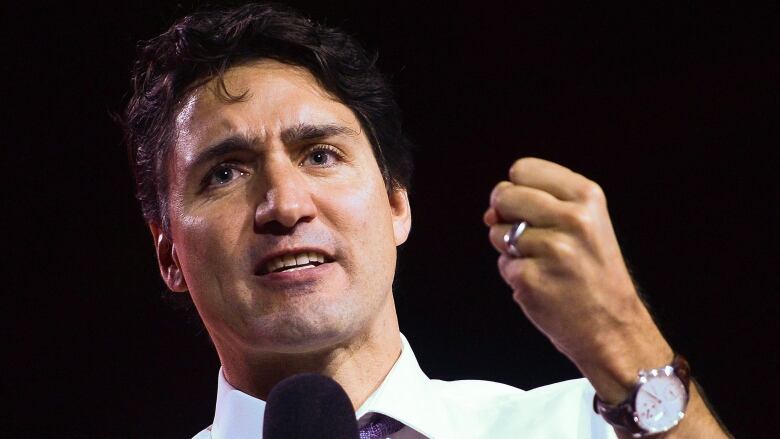Justin Trudeau may see purpose in the time of Trump
Responding to Trump and Trumpism will entail far more than words

The morning after the troubled United States gave itself over to Donald J. Trump, a man who has trafficked in xenophobia, race-baiting, nationalismand misogyny, andwhose temperament and choices could rattle the global order, Justin Trudeau did as Justin Trudeau does: appearing on a stage near Ottawa to encourage the teenagersat a WE Day event, the travelling road show of youth empowerment, charity and social improvement.
After a bit of a pep talk about their capacity for leadership, the prime minister segued to the looming spectre of a changed world.
"I know that a number of you probably stayed up a little later last night towatch some of the election returns with your families," he said.
There seemed to be some disenchantment in the crowd. Trudeauput a hand up as if to ask for calm.
- How Trump defied pundits and pollsters to win the White House
- What Trump's victory could mean for Canada
- How should Justin Trudeau respond to Donald Trump on trade and economy?
"And I know that some of you might have had questions for your parents this morning," he said.
That surely goes for more than the nation's teenagers.
"So I want to take a minute to chat with you a bit about that," the prime minister offered.
Trudeau's message was more or less that everything will be okay or at least that the relationship between Canada and the U.S. will endure, and thathe intends to work positively with the incoming American administration.
It was just enough for the morning after, the formal assurances of a national leader who is duty-bound to tend towards the cautious and diplomatic.
There has been, for months now, some clamouring for Trudeau he who seems to represent exactly the opposite of Trump to say something about what was happening in the United States. He has repeatedly demurred, and surely with good reason: during the campaign it might've only given Trump something else to exploit, and now there is a continental relationship to manage.
But responding to Trump and Trumpismwill entail far more than words.For Canada, thatcould mean differentiating ourselves anew.
Defining ourselves by how we differ from Americans
If you are seeking reassurances, there is the fact the U.S. has survived great calamities. Butit is only reasonable to worry about what Trump could mean for global security and prosperity and thecontinued impact he will have on American culture, discourse and society.
Even if the United States is still a city on a hill, the light seems to have gone out.
In Canada, of course, we have long defined ourselves by how we seem to differ from Americans. And however lazythat method of measurement might have been in the past, it might be justified now, at least as a motivation.
Whatever Canada's faults, however ithas failed in the past, there is much to be said for standing in opposition to what now seems to dominate American politics, not with self-satisfaction but with a renewed and newly urgent commitment to the plurality, community, benevolence and reason that is now lacking in the United States.
Countering social discord and cynicism about politics
Trump's rise seems traceable to at least two phenomena: cynicism toward the political process and social and ethnic discord. And so that is where Canadian attention should turn now.
If Washington did not seembroken and corrupt, it might not have been so easy to elect Donald Trump. And even if Canada's political institutions suffer nothing comparable to the dysfunction and excess that afflicts the American system the legislative gridlock, gerrymandering and loosely regulated fundraisingCanadian democracy is not quite a perfect example of openness, responsiveness and relevance.
Regardless of the fate of electoral reform, Trudeau's government and Parliament itself should strivefor a broader, smarter and more serious debate. Government would benefit from seeming something morethan wasteful.In light of the fundraising controversies that continue to beleaguer his government, Trudeau might think seriously about wholesale reforms of political financing.
- Trudeau says government's popularity has dampened public's desire for electoral reform
- Fuss over ministers' fundraising ignores why politicians chase dollars
- Ethics commissioner wants tighter rules on 'pay-to-play' fundraisers
The prime minister has already enthusiastically pledged himself to multiculturalism, and his warm welcoming of Syrian refugees made Canada an international example of inclusion, but economic integration and public acceptance are fundamentalconcerns.
The posturing and rhetoric of Kellie Leitch and Steven Blaney, the two Conservative leadership candidates who have enthusiastically stoked concerns about immigration and the niqab, cannot be casually dismissed. And if they are campaigning on such stuff, it is surely because they see existing support for it.
But even if the most virulent critics of diversity cannot be mollified, the general acceptance of newcomers will always loom. Immigrants and refugees must be seen succeeding, cultural differences must be openly addressed and communities must be brought together.
"One of the most difficult and urgent global problems is how to develop societies where people of different cultures can live together and build common ground," Trudeauhimself said in March 2015, when he condemned the former Conservative government's move to ban the niqab during the citizenship oath.
Shared economic prosperity might make diversity easier to embrace, but the future of the global economy is now only more unclear. And in places like Southwestern Ontario there arelikely towns that already resemble the sorts of American communities that voted Trump.
How does Trudeau really feel?
It would surely be interesting to know how reassured the prime minister is himself today.
He no doubt understands the continental, global and domestic problems that Trump could bring. He presumably is appalled bythe politics Trump practices.
At some point there might be a moment to repudiate or condemn all that.
But regardless, there is the work of nurturing and reinforcinga country that stands for the opposite ofwhat Donald Trump represents.












_(720p).jpg)


 OFFICIAL HD MUSIC VIDEO.jpg)
.jpg)



























































































